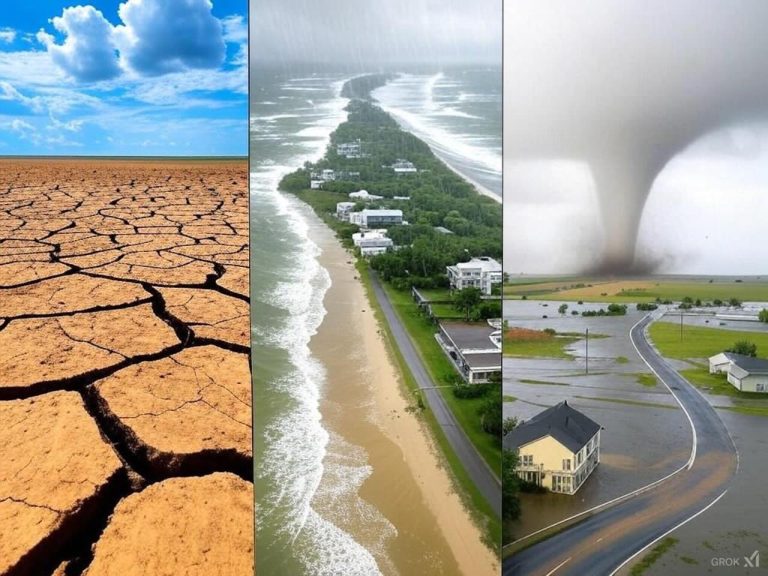
The World Meteorological Organization (WMO) article “Climate Change Impacts in 2024 Grip Globe” paints a terrifying picture of an earth in chaos, with extreme weather events attributed to man-made climate change. [emphasis, links added]
While this narrative is emotionally appealing to low-information readers, it incorrectly confers short-term weather events with long-term climate trends.
This is a fundamental error that undermines the scientific integrity of these claims, especially since the World Meteorological Organization itself actually defines what climate is:
…average weather conditions at a specific location and over an extended period of time.
In addition, historical data shows that humans are not facing an escalating climate crisis. Instead, they are more resilient to extreme weather, and weather-related deaths have dropped significantly over the past century.
One of the core flaws of the WMO article is the failure to distinguish between weather and climate. Weather includes short-term atmospheric phenomena such as heat waves, storms, and rainfall, while climate refers to long-term patterns and averages spanning decades or centuries.
The distinction is crucial, but the WMO has blurred the lines by suggesting that individual weather events in 2024 are clear evidence of climate change.
Only long-term trends in weather over thirty years or more show climate change, and no long-term trends in worsening extreme weather events were found in the data.
as highlighted climate realism, “Extreme weather events have occurred for thousands of years, often independent of human influence.”
The website states Attributing every flood or heat wave to climate change ignores natural variability and fails to take into account the complexity of atmospheric systems.
Even the Intergovernmental Panel on Climate Change (IPCC) acknowledges the difficulty of attributing specific weather events to long-term climate trends, noting that such attribution requires rigorous analysis and cannot rely on anecdotal observations.
In short, the WMO’s approach is deeply misleading, using weather events as a propaganda tool to sell the climate emergency narrative.
While the WMO article focuses on the direct impacts of extreme weather, it conveniently ignores a key fact: Deaths from weather-related disasters have dropped significantly over the past 100 years.
In the 1920s, the global average annual death toll from such disasters was approximately 485,000. Today, that number has dropped by more than 98%, to less than 10,000 people a year. This is evidence not of escalating danger but of extraordinary human progress. See picture below.

See details Climate at a glanceThe dramatic decline in weather-related deaths is due to improvements in forecasting, emergency response, infrastructure and communications technology.
Humanity's ability to predict and adapt to extreme weather has improved exponentially, saving millions of lives and mitigating the effects of natural disasters.
Far from becoming more vulnerable, we are more resilient than ever.
also, Watted Stressing that while global news coverage of extreme weather events has increased – creating the illusion that conditions have worsened –The actual frequency and intensity of such events remains within historical normal ranges.
This emphasizes the importance of context, reminding readers that singling out extreme events and ignoring overall trends can lead to serious distortions in public perception and costly government policy errors.
Another flaw in the WMO's argument is the assumption that all unusual weather patterns are the result of human activity.
While the climate system may be influenced by some human factors, it is also susceptible to natural changes.
Phenomena such as El Niño, volcanic activity and solar cycles play a greater role in shaping weather patterns and must be taken into account when assessing the causes of extreme events.
For example, the World Meteorological Organization article mentions record-breaking rainfall and flooding in 2024, implying that these are unprecedented.
However, as pointed out climate realismhistorical data shows that similar events occurred long before industrialization. Ignoring this historical context creates a distorted view of current conditions and promotes unnecessary alarmism.
The WMO's approach is emblematic of a broader trend in climate reporting: using short-term weather events as evidence of long-term climate change. This strategy is not only scientifically flawed, but also dangerously misleading.
By conflating weather and climate, such narratives undermine public trust in science and promote policies that are often more harmful than the phenomena they are designed to address.
Weather is not climate. Confusing the two is either an act of ignorance or deliberate deception…
This alarmist rhetoric has real-world consequences, driving economically disastrous policies that disproportionately harm the world's poorest people.
For example, directing resources toward exaggerated climate threats may prepare communities for immediate challenges such as poverty, disease, and actual natural disasters.
WMO's “Impact of climate change in Grip Globe 2024” exemplifies the misuse of short-term weather events to promote a narrative of the long-term climate crisis. This sensationalism not only undermines public understanding of climate science but also promotes misguided policies that prioritize fear over facts.
Weather is not climate, and conflating the two is either an act of ignorance or deliberate deception, both of which can result in resources being misdirected and endangering people's lives and well-being.
The public should hold climate reporting to a higher standard – one that prioritizes scientific accuracy over sensational headlines. For anything else, the stakes are too high.
Read more Climate Realism
